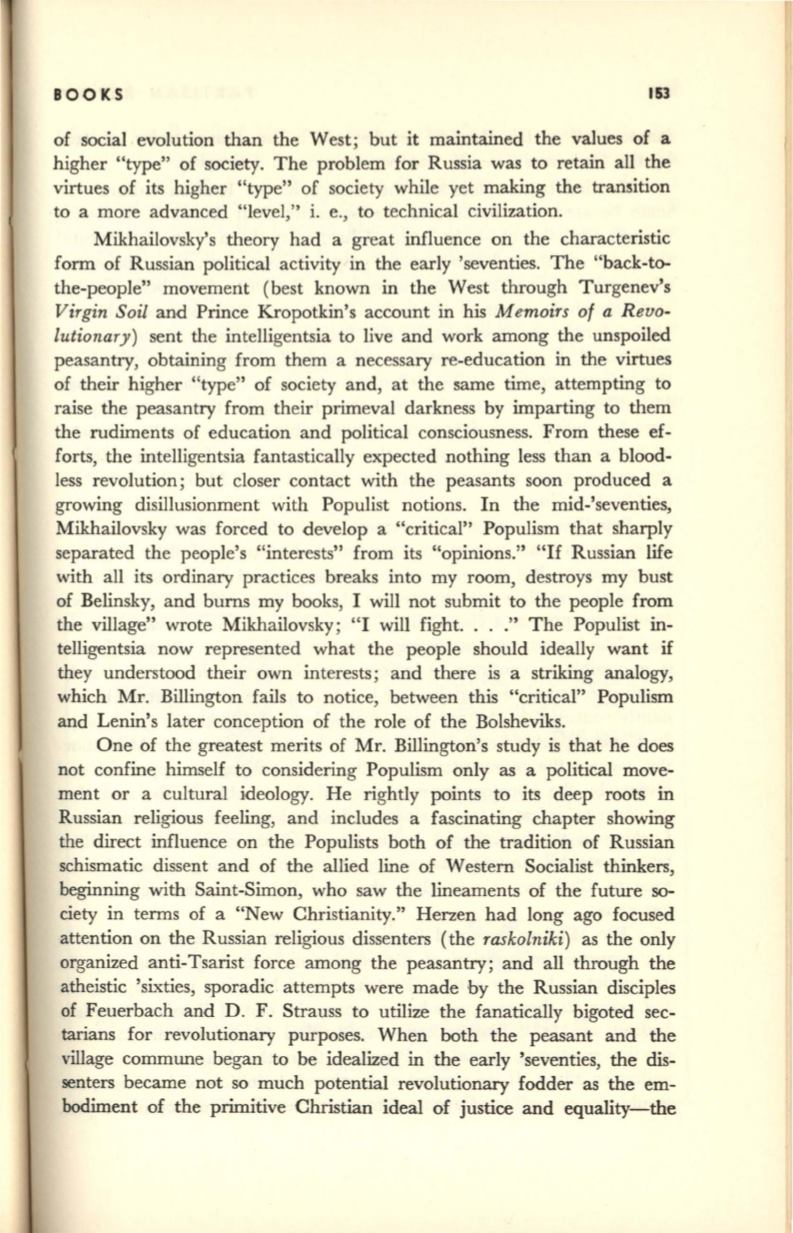
BOOKS
153
of social evolution than the West; but it maintained the values of a
higher "type" of society. The problem for Russia was to retain all the
virtues of its higher "type" of society while yet making the transition
to a more advanced "level," i. e., to technical civilization.
Mikhailovsky's theory had a great influence on the characteristic
form of Russian political activity in the early 'seventies. The "back-to–
the-people" movement (best known in the West through Turgenev's
Virgin Soil
and Prince Kropotkin's account in his
Memoirs of a Revo–
lutionary)
sent the intelligentsia to live and work among the unspoiled
peasantry, obtaining from them a necessary re-education in the virtues
of their higher "type" of society and, at the same time, attempting to
raise the peasantry from their primeval darkness by imparting to them
the rudiments of education and political consciousness. From these ef–
forts, the intelligentsia fantastically expected nothing less than a blood–
less revolution; but closer contact with the peasants soon produced a
growing disillusionment with Populist notions. In the mid-'seventies,
Mikhailovsky was forced to develop a "critical" Populism that sharply
separated the people's "interests" from its "opinions."
"If
Russian life
with all its ordinary practices breaks into my room, destroys my bust
of Belinsky, and burns my books, I will not submit to the people from
the village" wrote Mikhailovsky ; "I will fight. . . ." The Populist in–
telligentsia now represented what the people should ideally want if
they understood their own interests; and there is a striking analogy,
which Mr. Billington fails to notice, between this "critical" Populism
and Lenin's later conception of the role of the Bolsheviks.
One of the greatest merits of Mr. Billington's study is that he does
not confine himself to considering Populism only as a political move–
ment or a cultural ideology. He rightly points to its deep roots in
Russian religious feeling, and includes a fascinating chapter showing
the direct influence on the Populists both of the tradition of Russian
schismatic dissent and of the allied line of Western Socialist thinkers,
beginning with Saint-Simon, who saw the lineaments of the future so–
ciety in terms of a "New Christianity." Herzen had long ago focused
attention on the Russian religious dissenters (the
raskolniki)
as the only
organized anti-Tsarist force among the peasantry; and all through the
atheistic 'sixties, sporadic attempts were made by the Russian disciples
of Feuerbach and D. F. Strauss to utilize the fanatically bigoted sec–
tarians for revolutionary purposes. When both the peasant and the
village commtule began to be idealized in the early 'seventies, the dis–
senters became not so much potential revolutionary fodder as the em–
bodiment of the primitive Christian ideal of justice and equality-the


